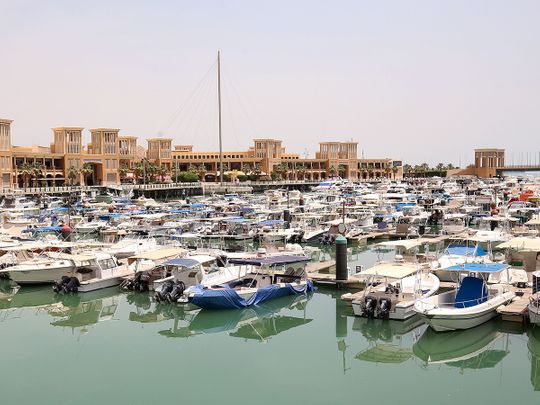
Kuwait City: Crisis economics gets complicated when the budget deficit could be equivalent to two-fifths of a nation's entire output.
It's the case in Kuwait, among the world's richest nations, which has so far mustered one of the smaller packages of fiscal stimulus among Gulf economies. A government announcement this week that could result in added assistance for Kuwaitis in the private sector might stretch the budget deficit further.
National Bank of Kuwait SAK, the country's biggest lender, already predicts the shortfall will reach 40 per cent of gross domestic product in the fiscal year that started April 1, or double what Fitch Ratings forecast a month ago. That would be the most since the 1991 Gulf War and its aftermath.
No country is expected to run a deficit in excess of 30 per cent this calendar year, according to the International Monetary Fund.
No getting away from oil
Kuwait's extreme dependence on oil is to blame, with hydrocarbon sales accounting for an estimated 90 per cent of total government income. Crude prices are around half the level Kuwait needs to balance the budget - before the mandatory annual transfer of 10 per cent of revenue to its wealth fund.
The government's fiscal straits couldn't come at a worse time for businesses. According to a new survey by Bensirri, a Kuwait-based independent communications consultancy firm, 45 per cent of companies polled in the country have shut down operations, 22 per cent are experiencing difficulty getting financing and 80 per cent won't be able to cover more than six months of fixed costs.
Unprecedented
"The situation is dire," it said in the report. "It is unfortunate in the middle of this unprecedented crisis we see some policy makers engaging in political bickering."
Some entrepreneurs are no longer counting on relief. Although disappointed that the government hasn't acted swiftly, Abdulaziz B. Al-Loughani has moved on, raising his own capital to save his e-commerce business. Al-Loughani said his company, called Floward and specializing in flowers and gifts, has been better supported in Saudi Arabia, where it also operates.
"There's no free lunch this time," he said. "Everything so far is just assurances and acts of good will."
Some relief, but in need of more
To help fund its battle with the pandemic, Kuwait has allocated an extra 500 million dinars ($1.6 billion) this fiscal year. The central bank also reduced capital adequacy requirements for lenders and eased some regulations to provide extra liquidity for vital parts of the economy and unlock credit.
Compounding its budget pinch is the government's inability to issue debt because of disagreements with lawmakers. After a debut Eurobonds issuance in 2017, Kuwait's public-debt law lapsed, rendering it unable to offer bonds internationally.
"The government hasn't prioritized this law over the last three years by convincing parliament to pass it," said Muhannad Al-Sanea, chairman of the Kuwait Economic Society. "No one opposes this law, we need it urgently, but it should be directed for investment purposes and not wasteful spending."
Dip into SWF
Kuwait has even discussed the possibility of turning to the sovereign wealth fund for a loan should the depressed oil prices and the mounting cost of fighting the coronavirus pandemic deplete its cash reserves. Estimates for how long the Treasury can cover its expenses have ranged from two to 12 months.
The private sector has a crucial role to play in Kuwait's programme to become a commercial hub by 2035.
The vast majority of the private sector depends on expatriates, who account for some two-thirds of Kuwait's population of about 4.8 million. Their presence is now under scrutiny by the executive in a bid to balance the demographics.
"Not enough has been done," said Manaf K. Al-Menaifi, Director General of the National Fund for SME Development.
"This is the first catastrophe to hit SMEs. So if the response from the government isn't smooth and fast or capable of motivating others to join the private sector, then we have lost a bigger battle.
"Time has run out for the ideal solution but we really need to inject money into the businesses now."








